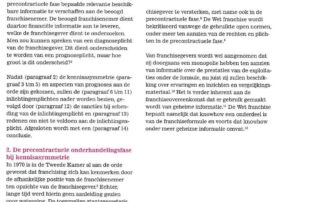Changes at hard franchise formula Albert Heijn
To what extent can a franchisee require the franchisor to make changes to the formula? The District Court of Noord-Holland has ruled in summary proceedings of September 11, 2014 (ECLI:NL:RBNHO:2014:9474) ruled on the claim of an Albert Heijn franchisee who demanded from Albert Heijn that Albert Heijn cooperate in installing a so-called Ageviewer. An Ageviewer is a system for checking the age of customers who want to buy age-related products, such as alcoholic beverages and tobacco.
It has been established that Albert Heijn’s franchise formula is one in which the cooperation is bound by strict rules that affect almost all areas of business operations, the so-called ‘hard franchise’. The cash register system that is prescribed for franchisees has a control mechanism whereby the cash register blocks when an age-related product is scanned by the cash register. The cashier must then carry out a check.
The franchisee in question states that carrying out an age check for certain products is a legal obligation and that Ageviewer can improve the effectiveness of the check. The franchisee has informed Albert Heijn that it wants to introduce a new control system whereby a better estimate of the age can be made centrally based on camera images. Apparently, the use of Ageviewer requires Albert Heijn to enable the connection to the existing cash register system. Albert Heijn has indicated that it does not want to participate in this.
Albert Heijn has indicated that although the existing system is not 100% effective, there is also no legal obligation to introduce Ageviewer. Albert Heijn also believes that Ageviewer is at odds with its obligations the Personal Data Protection Act (Wbp). Albert Heijn also points to the interests of the chain and the interests of the other franchisees. The court follows Albert Heijn in its argument and is of the opinion that, given the nature of the franchise relationship (in the context of the “hard franchise” formula), this matter should be settled collectively and uniformly with the franchisees.
It does not follow from this ruling that the franchisee should not apply additional control mechanisms himself. It is possible that if the claim had been formulated differently, the outcome would have been different. For example, the franchisee could have directed the claim against an obligation on Albert Heijn to disclose certain data from the cash register system, so that the franchisee itself has the opportunity to effect an alternative identification of age-related products.
in short, with “hard franchising” individual deviations and exceptions from the formula can sometimes be difficult to make, especially if the interests of the franchisees are well-functioning. Such a consultation structure will be carefully considered in the interest of the collective. With “soft franchising” individual franchisees will have more space and freedom to follow their own course.
mr. AW Dolphijn – Franchise lawyer
Ludwig & Van Dam Advocaten Franchise attorneys, franchise legal advice. Do you want to respond? Mail to dolphijn@ludwigvandam.nl

Other messages
Article Franchise+: “Is the franchisor bound by the statutes of the franchisees’ association?” – mr. M. Munnik – dated November 11, 2021
Within a franchise organization it is not uncommon for franchisees ...
Article The National Franchise Guide: “Humps in the standstill period” – mr. T. Meijer – dated October 19, 2021
The Franchise Act has been seen by a large number ...
Unilateral changes to opening hours are prohibited from 1 January 2022
On July 14, 2021, a legislative amendment to the shopping ...
Litigation as a franchisees association.
The Eye Wish Opticiens franchisees have recently filed opposition to ...
Between the franchisor’s diagnosis and forecasting duty
In the leading legal scientific journal WPNR, Mr. Dolphijn a ...
Franchise+ article: “Violation of a non-compete clause will cost the franchisee dearly.” – mr. C. Damen – September 23, 2021
The fact that the violation of a non-compete clause included ...





